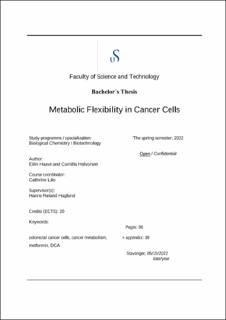| dc.contributor.advisor | Hagland, Røland, Hanne | |
| dc.contributor.author | Haave, Eilin | |
| dc.contributor.author | Halvorsen, Camilla | |
| dc.date.accessioned | 2022-09-15T15:51:51Z | |
| dc.date.available | 2022-09-15T15:51:51Z | |
| dc.date.issued | 2022 | |
| dc.identifier | no.uis:inspera:108213961:50269601 | |
| dc.identifier.uri | https://hdl.handle.net/11250/3018189 | |
| dc.description.abstract | Abstract
Colorectal cancer is the third most occurring cancer type among both men and women in the United States. Even though cancer therapies have been revolutionarily improved over the decades, there is a high demand for more effective treatments, making research within the complex aspect of cancer crucial for the design of highly specific and effective therapies. Manipulation of cancer metabolism has been an interesting topic of research and has shown to be a promising field for future therapeutic methods as a part of cancer therapy.
Metformin (bimethylbiguanide) belongs in a class of drugs named biguanides and is today used as a medication to treat type-II diabetes. Dichloroacetate (DCA) is currently used to treat diabetes mellitus, lipid and lipoprotein disorders, pulmonary arterial hypertension, and acquired and congenital lactic acidosis. Both drugs have shown interesting effects on the metabolism of cancer.
The aim of this study was to examine the effects of metformin and DCA on colorectal cancer cell lines HCT116 and SW948 with the use of alamarBlue- and CCK-8 assays as well as flow cytometry.
The results indicate that metformin has a decreasing effect on the viability in both cell lines, where the most effective treatment was a 6 mM concentration after an exposure period of 48 hours. DCA showed an opposing effect in respect to metformin, where the highest concentration (6 mM) and longest exposure period (48 hours) generated the highest viability. These results indicates that our specific cell lines are more reliant on the mitochondrial metabolism rather than the glycolytic.
The flow cytometry for this study measured the expression of Akt, p-Akt, AMPK, and p-AMPK. Both cell lines showed an increase in the expression of p-Akt and AMPK after the treatment with metformin. SW948 also had a minor shift in the Akt expression. DCA had no impact on neither of the protein expressions. | |
| dc.description.abstract | Abstract
Colorectal cancer is the third most occurring cancer type among both men and women in the United States. Even though cancer therapies have been revolutionarily improved over the decades, there is a high demand for more effective treatments, making research within the complex aspect of cancer crucial for the design of highly specific and effective therapies. Manipulation of cancer metabolism has been an interesting topic of research and has shown to be a promising field for future therapeutic methods as a part of cancer therapy.
Metformin (bimethylbiguanide) belongs in a class of drugs named biguanides and is today used as a medication to treat type-II diabetes. Dichloroacetate (DCA) is currently used to treat diabetes mellitus, lipid and lipoprotein disorders, pulmonary arterial hypertension, and acquired and congenital lactic acidosis. Both drugs have shown interesting effects on the metabolism of cancer.
The aim of this study was to examine the effects of metformin and DCA on colorectal cancer cell lines HCT116 and SW948 with the use of alamarBlue- and CCK-8 assays as well as flow cytometry.
The results indicate that metformin has a decreasing effect on the viability in both cell lines, where the most effective treatment was a 6 mM concentration after an exposure period of 48 hours. DCA showed an opposing effect in respect to metformin, where the highest concentration (6 mM) and longest exposure period (48 hours) generated the highest viability. These results indicates that our specific cell lines are more reliant on the mitochondrial metabolism rather than the glycolytic.
The flow cytometry for this study measured the expression of Akt, p-Akt, AMPK, and p-AMPK. Both cell lines showed an increase in the expression of p-Akt and AMPK after the treatment with metformin. SW948 also had a minor shift in the Akt expression. DCA had no impact on neither of the protein expressions. | |
| dc.language | eng | |
| dc.publisher | uis | |
| dc.title | Metabolic Flexibility in Cancer Cells | |
| dc.type | Bachelor thesis | |
